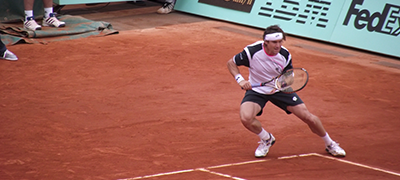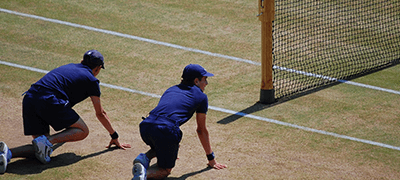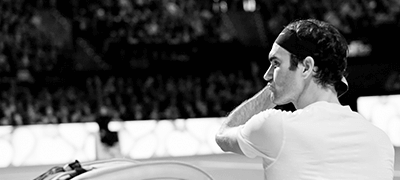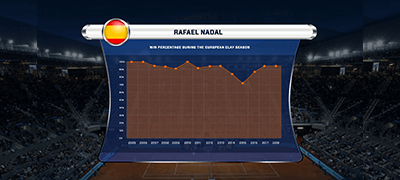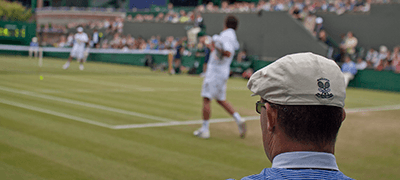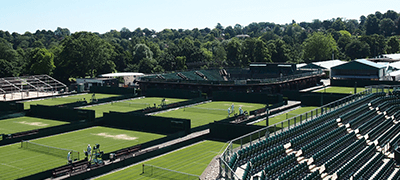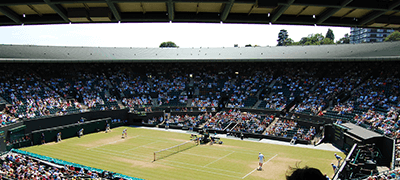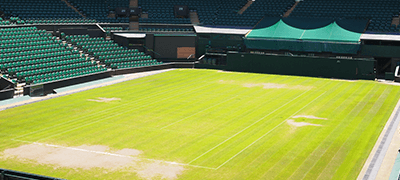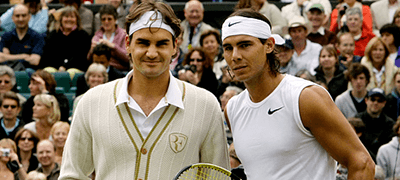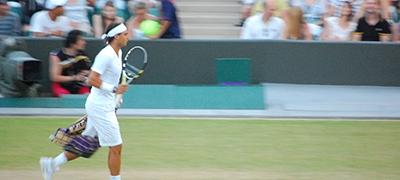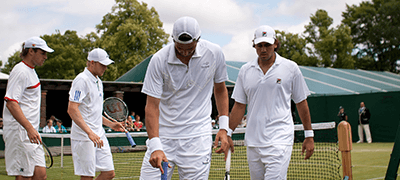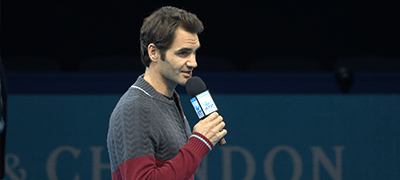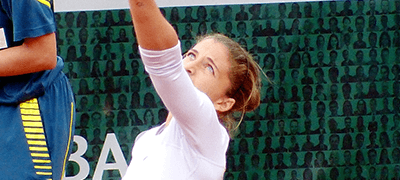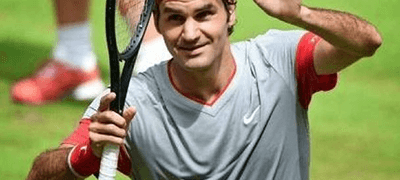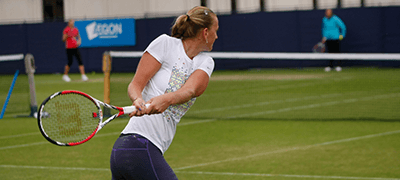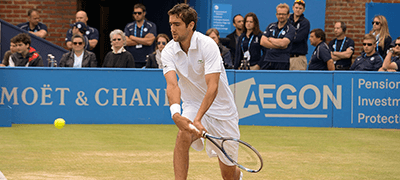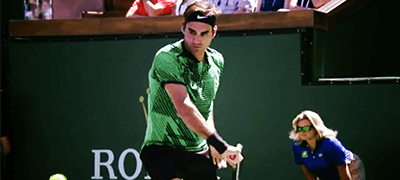Mansour Bahrami: A legendary gift to the tennis world
Jul 27 8 min read
9:49 am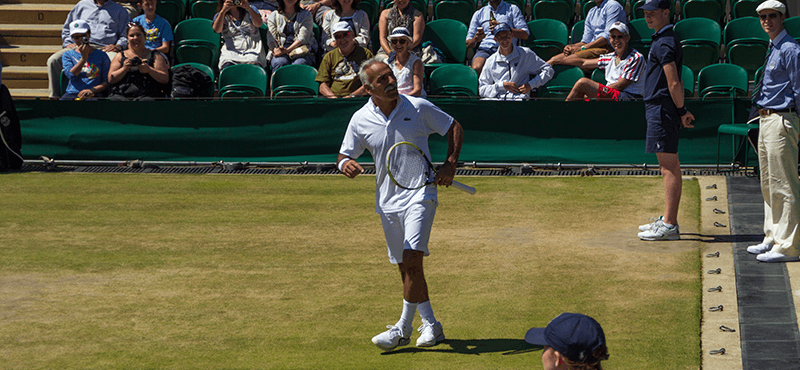
Mansour Bahrami on Flickr by big-ashb under CC2.0
"So you want to hear my life story? You think they will believe this? The frying-pan, the poverty, the years of not being allowed to hit a tennis ball, sleeping rough in Paris, on the run from the police… yes, I suppose my tale is a little out of the ordinary."
It indeed is an extraordinary tale. Imagine being ranked 192 in the world, with a winning percentage less than 50 and yet being termed a legend by the greats of the game. An Iranian tribesman whose life journey is an inspiration for millions around the globe, Mansour Bahrami is a 62-year-old veteran tennis player who is a regular feature at Wimbledon’s senior invitational matches. Bahrami isne of tennis’ amazing showman, with the ability serve with six balls in his hand, catch a ball in his shorts’ pocket, scare a ball boy on the court not to mention an arsenal of trick shots. However, hehad his life turned around just by catching that one flight that would change his luck forever. So get ready to read one of the best stories and one of the greatest chapters that the book of tennis ever had.
THE BEGINNING
Mansour Bahrami’s father was a gardener in Iran’s biggest sports complex. Due to this, Mansour was well acquainted with the grounds of almost every major sport in the world. When he was three years old, his eyes met the turf of a tennis court in the sports complex that attracted him in a flash. But to his dismay, it was one sport that he was forbidden to play. The reason? Tennis in those days was reserved for only the rich and the elite.
Even as a little kid, Mansour had a neat sketched out picture of a tennis racquet in his mind. Anything that resembled that picture was a tennis racquet for him.
"When I was seven, I would play with anything that looked vaguely like a racquet. A dustpan, frying-pan, broom-handle, a piece of wood. That’s how I learned, usually at night, barefoot, when they had drained the swimming-pool – hitting an old ball someone had thrown away against the wall of the pool with whatever I could lay my hands on: I was that desperate to play tennis!
Today when Mansour recollects those days he says he was very lucky to teach himself tennis in that fashion. According to him, a proper coach would scold him for making a mockery of himself by playing with various random objects in place of a real racquet.
FIRST BREAKTHROUGH
The Iranian Tennis Federation was looking for players in order to compete for the Davis Cup. This is when they learned about Mansour’s keen interest in tennis. Finally, Mansour got his first two racquets from the Iranian Tennis Federation at the age of 13.
In his Davis Cup debut in 1975, Mansour was annihilated by Britain’s Roger Taylor, losing 6-0 6-0 6-2. However, he took the loss in his stride, developing his game quickly to win nine of the 11 matches that he played. Mansour was finally enjoying playing the sport he fell in love with. As a result, at the tender age of 16, Mansour led his team to Davis Cup glory.
SETBACK
After the Davis Cup victory, just when Mansour thought his career was building up, the Iranian Revolution took place. The Pahlavi Dynasty led by the Shah was overthrown and replaced by the Islamic Republic under the leadership of Ayatollah Ruhollah Khomeini. Tennis, being a western sport was banned in Iran and all the tennis courts were shut down. For the next three years, Mansour was not able to play tennis. He spent his time by playing backgammon.
THAT FLIGHT TO NICE
During the revolution, a single tournament of tennis was held in Iran. It was named the Revolutionary Cup. Mansour and many fellow Iranian tennis players saw this as an opportunity to change their respective destinies. Mansour reached the finals and was facing his old friend, Ali Madani. Ali Madani had never lost to Mansour before. But that day, fate rested with Mansour.
"Mansour won the first set, 6-2. I started attacking more, really hitting out, and won the second set, 6-0. But Mansour adjusted his tactics and barely beat me, 7-5, in the third. It was my chance, my opportunity, and I lost it."
Till this day Ali Madani regrets losing to Mansour as he believes that match would have changed his life around. Madani never made it big in the tennis world and today is settled as a tennis coach.
"We both lost a lot of time. But Mansour got to France and kept playing. I had to wait two more years, and my chance passed me by. It’s hard to lose your dream without getting to try."
The winner of that event received some prize money and a ticket to Athens. Mansour took the price money and went to give it to his girlfriend. But, little did he know, that some advice from her would change his life forever.
"The next day she came back to me and said that I should take it and pay an extra $200 to change the ticket to get to Nice, so I would have a chance to play tennis. It was very selfless of her to send me away and it changed my life forever."
Mansour took the advice but was faced with the problem of getting a visa. One of his friends came to his rescue. He knew the foreign minister, Sadegh Ghotbzadeh. Mansour filled in and handed the required documents to his friend, who later got the approval of Sadegh Ghotbzadeh. 18 months later, Ghotbzadeh was executed by a firing squad. Mansour had already reached France.
FRANCE
On reaching France, Mansour realized he did not have enough money to survive in France’s high standards of living. So he went to a casino and gambled. Unfortunately, he lost all his money. Years passed and Mansour was finding it difficult to survive in France. When his visa expired he was careful to hide fromapproaching police cars and learnt to stay low. If caught, he would have been booked for the next flight to Iran.
"I chose France because there are hundreds of small tournaments with prize money. But you have to win to collect the money. For weeks at a time I had nowhere to sleep, so I would walk the streets of Paris. Often, I would make one baguette last three or four days."
In 1981, after reaching the third round of the French Open as a qualifier, his cause was finally taken up by two leading French newspapers – L’equipe and Le Figaro. They demanded Mansour’s visa renewal and it was finally done.
ATP PRO
At the age of 30, Mansour turned pro and was finally a part of the professional circuit. He knew his best days were behind him but he decided to make most of whatever opportunity he got. In 1989 he reached his career best by being the runner up in the 1989 French Open Doubles final. He won two more doubles titles in his career – the 1988 Geneva Open and the 1989 Toulouse Grand Prix.
"I lost nine years of my life. All my best results (fifteen finals and five tournament victories) came after the age of thirty. I was thirty-three when I reached the French Open doubles final. Am I angry? No, I’m not angry, I feel I am a very lucky man."
Fondly known by the masses as the “The Court Jester,” Mansour retired from professional tennis, aged 33.
A NEW CAREER
Mansour Bahrami’s maverick tactics and showmanship had made him one of the most entertaining players on tour. Post-retirement, he was a regular feature of the Legend’s tour and is a crowd favorite at Wimbledon.
"I love playing. I love to feel people are having fun watching me. I cannot tell you how many matches I lose that I should probably win because I am joking around. Often I do win, but I feel the crowd haven’t enjoyed it so much, so I am upset. I love to make them laugh. When the audience laughs, I am the happiest man in the whole world."
It’s been more than 20 years since Mansour has been on the invitational circuit and he has been traveling the globe and entertaining people with his mind-boggling skills worldwide.
"But this is the way I like tennis. For me tennis is just a game. I never played tennis to become rich or to make money but it happens now that people pay me to play tennis. It doubles the joy."
Mansour Bahrami might have never won a slam but he is still dubbed as a “genius” by John McEnroe, “a maestro” by Ilie Nastase and a “legend” by Bjorn Borg. Rod Laver believes that Mansour Bahrami is the most naturally gifted player to hold a tennis racquet.
"Mansour makes tennis so much fun. If you haven’t seen him play or ‘perform’ yet, it’s a must!" - Roger Federer



